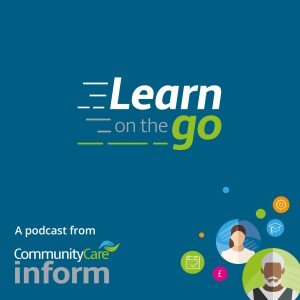
Children's networks episode 1: Family finding, family seeing
 2022-03-18
2022-03-18
Download
Right click and do "save link as"
Welcome to Learn on the go, a Community Care Inform podcast where we discuss what the latest research, practice models and policy guidance mean for your practice.
This episode, which follows subscribers' requests for resources around children's networks and connections, is about the Family Finding/Family Seeing model which hails from the US but is now being used in other countries, including by several local authorities in the UK. We spoke to Kevin Campbell, the model's author who has over 30 years' experience of social services leadership, and Elizabeth Wendel, co-author of the model and a social worker by background. It covers the roots and scientific underpinning of the approach, including the impact of family separation across the life course, and how the concepts of 'healing' and 'positioning' might be used in social work. Our guests discuss the changes individual practitioners can make in their own work that will make a difference for children and families, whatever imperfect system they are practising in and without waiting for reform. The questions were asked by Joanna Silman, senior content editor at Community Care Inform.
Community Care Inform subscribers can access additional resources and a written transcript of the podcast: https://www.ccinform.co.uk/learning-tools/family-finding-family-seeing/
References and further reading (websites and article titles are hyperlinks)
Familyseeing.org (https://www.familyseeing.org)
Center on the Developing Child, Harvard University (https://developingchild.harvard.edu/)
Bruce D Perry MD (2004) Maltreatment and the Developing Child: How Early Childhood Experience Shapes Child and Culture (https://www.lfcc.on.ca/mccain/perry.pdf)
Jack P. Shonkoff MD and Andrew S. Garner MD PhD (2012), The Lifelong Effects of Early Childhood Adversity and Toxic Stress Pediatrics, 129 (1): e232–e246 (https://publications.aap.org/pediatrics/article/129/1/e232/31628/The-Lifelong-Effects-of-Early-Childhood-Adversity)
This is the Nuffield report by Amanda Sacker et al that looked at the health and social outcomes in adulthood of 5,700 people who spent time in care as children, compared to those of their age who were not in care: The lifelong health and wellbeing trajectories of people who have been in care: Findings from the Looked-after Children Grown-up Project (https://www.nuffieldfoundation.org/wp-content/uploads/2021/07/The-lifelong-health-and-wellbeing-trajectories-of-people-who-have-been-in-care.pdf)
The study on transitions is discussed in 'Behind the Stats: Mark Courtney on His Newest Study on Transition Aged Foster Youth in California' The Imprint, 6 August 2018 (https://imprintnews.org/analysis/behind-the-stats-mark-courtney-on-his-newest-study-on-transition-age-foster-youth-in-california/3183)
Lemn Sissay's 1995 Internal Flight documentary is in three parts on You Tube. His webinar with CC Inform is here: https://www.ccinform.co.uk/learning-tools/webinar-lemn-sissay-reflects-on-transitions-during-world-social-work-day/
You can read about the Corrymeela community here: https://www.corrymeela.org/about
The JAMA article about DSM mental health dianoses Kevin references is by Kennth S Kendler: Potential Lessons for DSM From Contemporary Philosophy of Science, JAMA Psychiatry, 2022;79(2):99-10. https://jamanetwork.com/journals/jamapsychiatry/article-abstract/2786972
You can read an open access brief discussion of the article here: https://www.madinamerica.com/2021/12/kenneth-kendler-implausible-psychiatric-diagnoses-even-approximately-true
view more
This episode, which follows subscribers' requests for resources around children's networks and connections, is about the Family Finding/Family Seeing model which hails from the US but is now being used in other countries, including by several local authorities in the UK. We spoke to Kevin Campbell, the model's author who has over 30 years' experience of social services leadership, and Elizabeth Wendel, co-author of the model and a social worker by background. It covers the roots and scientific underpinning of the approach, including the impact of family separation across the life course, and how the concepts of 'healing' and 'positioning' might be used in social work. Our guests discuss the changes individual practitioners can make in their own work that will make a difference for children and families, whatever imperfect system they are practising in and without waiting for reform. The questions were asked by Joanna Silman, senior content editor at Community Care Inform.
Community Care Inform subscribers can access additional resources and a written transcript of the podcast: https://www.ccinform.co.uk/learning-tools/family-finding-family-seeing/
References and further reading (websites and article titles are hyperlinks)
Familyseeing.org (https://www.familyseeing.org)
Center on the Developing Child, Harvard University (https://developingchild.harvard.edu/)
Bruce D Perry MD (2004) Maltreatment and the Developing Child: How Early Childhood Experience Shapes Child and Culture (https://www.lfcc.on.ca/mccain/perry.pdf)
Jack P. Shonkoff MD and Andrew S. Garner MD PhD (2012), The Lifelong Effects of Early Childhood Adversity and Toxic Stress Pediatrics, 129 (1): e232–e246 (https://publications.aap.org/pediatrics/article/129/1/e232/31628/The-Lifelong-Effects-of-Early-Childhood-Adversity)
This is the Nuffield report by Amanda Sacker et al that looked at the health and social outcomes in adulthood of 5,700 people who spent time in care as children, compared to those of their age who were not in care: The lifelong health and wellbeing trajectories of people who have been in care: Findings from the Looked-after Children Grown-up Project (https://www.nuffieldfoundation.org/wp-content/uploads/2021/07/The-lifelong-health-and-wellbeing-trajectories-of-people-who-have-been-in-care.pdf)
The study on transitions is discussed in 'Behind the Stats: Mark Courtney on His Newest Study on Transition Aged Foster Youth in California' The Imprint, 6 August 2018 (https://imprintnews.org/analysis/behind-the-stats-mark-courtney-on-his-newest-study-on-transition-age-foster-youth-in-california/3183)
Lemn Sissay's 1995 Internal Flight documentary is in three parts on You Tube. His webinar with CC Inform is here: https://www.ccinform.co.uk/learning-tools/webinar-lemn-sissay-reflects-on-transitions-during-world-social-work-day/
You can read about the Corrymeela community here: https://www.corrymeela.org/about
The JAMA article about DSM mental health dianoses Kevin references is by Kennth S Kendler: Potential Lessons for DSM From Contemporary Philosophy of Science, JAMA Psychiatry, 2022;79(2):99-10. https://jamanetwork.com/journals/jamapsychiatry/article-abstract/2786972
You can read an open access brief discussion of the article here: https://www.madinamerica.com/2021/12/kenneth-kendler-implausible-psychiatric-diagnoses-even-approximately-true
More Episodes
Care Quality Commission assessments
 2023-09-11
2023-09-11
 2023-09-11
2023-09-11
Campaign podcast with Luke Rodgers
 2023-08-29
2023-08-29
 2023-08-29
2023-08-29
Learn on the go: personality disorder
 2023-02-20
2023-02-20
 2023-02-20
2023-02-20
Restorative practice
 2022-07-26
2022-07-26
 2022-07-26
2022-07-26
Homelessness and safeguarding
 2022-05-25
2022-05-25
 2022-05-25
2022-05-25
Attachment-based trauma
 2022-02-09
2022-02-09
 2022-02-09
2022-02-09
Sibling sexual abuse
 2021-07-13
2021-07-13
 2021-07-13
2021-07-13
Supporting social workers in 2021
 2021-03-15
2021-03-15
 2021-03-15
2021-03-15
Anti-racist social work practice
 2020-07-09
2020-07-09
 2020-07-09
2020-07-09
0123456789101112131416171819
Create your
podcast in
minutes
- Full-featured podcast site
- Unlimited storage and bandwidth
- Comprehensive podcast stats
- Distribute to Apple Podcasts, Spotify, and more
- Make money with your podcast
It is Free
- Privacy Policy
- Cookie Policy
- Terms of Use
- Consent Preferences
- Copyright © 2015-2024 Podbean.com




